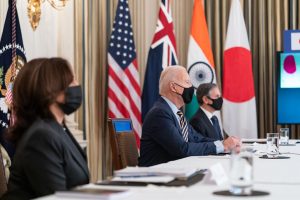With two key meetings of the Quadrilateral Security Dialogue, commonly known as the Quad, slated for the first half of 2022, participating leaders have an opportunity to further bolster ties between their countries at all levels of government while finding creative and holistic ways to manage national security risks. One item leaders should consider adding to the agenda is how to facilitate better coordination on international engagement between national and subnational officials throughout the four participating countries.
The Quad, a strategic dialogue between Australia, India, Japan, and the United States, is an ideal forum for such discussion. With Rahm Emanuel, the former mayor of the United States’ third most populous city, recently assuming his post as U.S. ambassador to Japan and Eric Garcetti, the current mayor of the United States’ second most populous city, nominated to serve as the ambassador to India, there is an opportunity for this important group of major Indo-Pacific democracies to utilize subnational diplomacy to better address shared security and economic challenges.
The first in-person Leaders’ Summit of the Quad took place in September 2021. The leaders discussed a range of initiatives aiming to address a number of major challenges, including “ending the COVID-19 pandemic, including by increasing production and access to safe and effective vaccines; promoting high-standards infrastructure; combatting the climate crisis; partnering on emerging technologies, space, and cybersecurity; and cultivating next-generation talent in all of [the] countries.” Cities and states have been on the frontlines of many of these issues and deeper collaboration among Quad countries across the local, national, and international levels can promote more effective responses.
It is clear cities are already engaging in international issues. A report released in October 2020 by the Chicago Council on Global Affairs and the University of Melbourne’s Connected Cities Lab in which representatives from 47 global cities were surveyed found that 86 percent of respondents indicated their city maintained an official international office.
Yet there are also risks associated with subnational diplomacy. The same survey indicated that less than half of the staff engaged in international engagement received any relevant training for their international activities. And those who did receive training indicated it was generally informal or self-guided.
This is concerning given the stakes of subnational diplomacy, particularly in the face of competition with China. Chinese officials and entities have been active in their engagement with subnational officials. And despite increased scrutiny of ties at all levels, Chinese officials continued that subnational engagement in the United States in the first year of the Biden administration.
As competition continues between China and members of the Quad, it will be critical to find ways to creatively engage in ways that mitigate risk. A 2018 Hoover Institution report on Chinese influence and U.S. interests examined ties between Chinese entities and U.S. subnational governments, “highlighting their potential for mutually-beneficial engagement as well as the potential risks that arise from insufficient due diligence.”
One way this risk can be mitigated, particularly given the lack of formal training that often takes place with city staff handling international engagement, is through deeper coordination between national and subnational governments. Some leaders within the Quad have recognized this need. For example, legislation was introduced in the United States Congress that would create an Office of Subnational Diplomacy at the U.S. Department of State.
Two upcoming meetings of the Quad present an opportunity for these four countries to prioritize national and subnational government cooperation on international issues. The foreign ministers of Quad nations are slated to meet in Australia in February followed by a summit with the leaders of the countries in Japan in the spring. By engaging in dialogue about subnational diplomacy, the Quad can position local governments to engage prudently and effectively on the international stage while bolstering the initiatives of the national governments through this deeper collaboration.

































